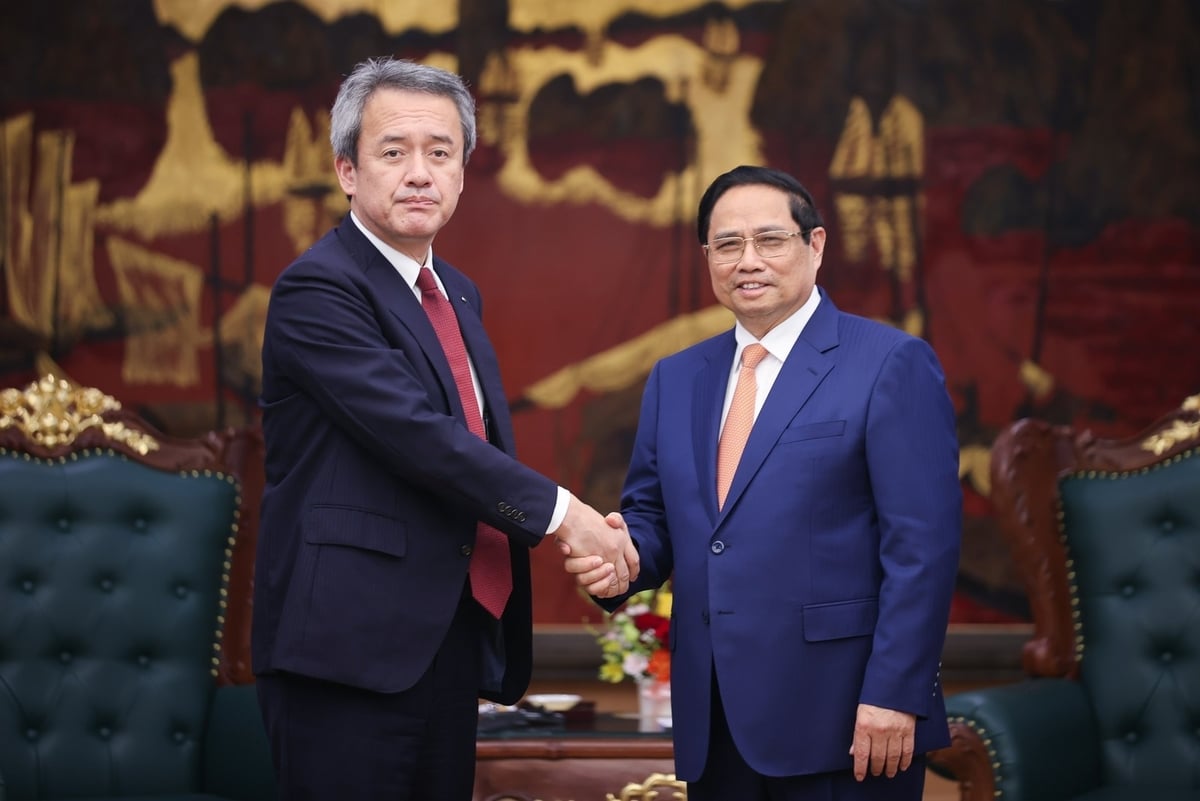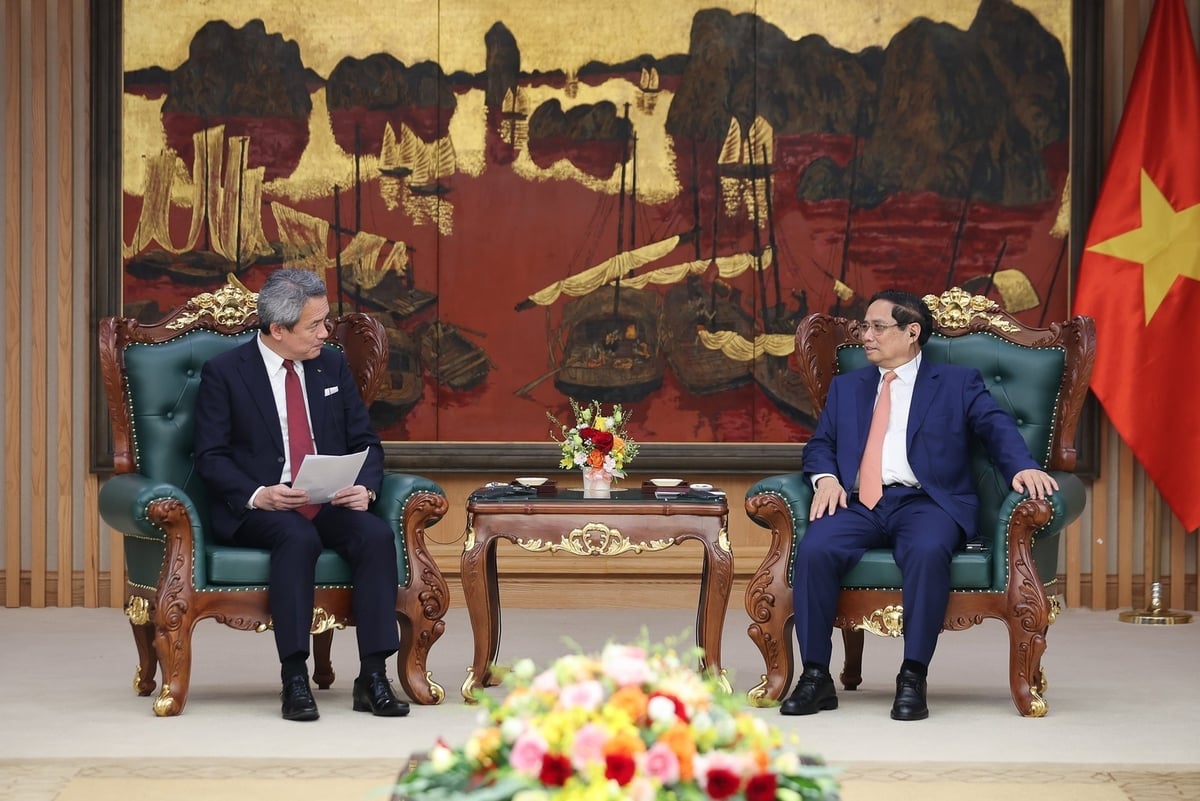November 12, 2025 | 09:07 GMT +7
November 12, 2025 | 09:07 GMT +7
Hotline: 0913.378.918
November 12, 2025 | 09:07 GMT +7
Hotline: 0913.378.918
Prime Minister Pham Minh Chinh received Mr. Masayuki Omoto, CEO of Japan's Marubeni Corporation, on the afternoon of July 14 during the latter's working visit to Vietnam.
Marubeni is a prominent investment and trading group in Japan. With 130 branches and offices in 68 countries worldwide, the group operates in most economic sectors and generates annual revenues of approximately USD 70 billion.

Prime Minister Pham Minh Chinh received Mr. Masayuki Omoto, General Director of Marubeni Corporation (Japan). Photo: VGP.
Marubeni has maintained a representative office in Vietnam since 1991 and has been investing in the country for eight decades. Currently, the corporation's projects in Vietnam employ approximately 7,500 Vietnamese employees and generate an annual revenue of approximately USD 3 billion.
In recent years, Marubeni has concentrated on critical sectors, including the import-export of goods (coal, seafood, coffee, grains, petrochemical products), joint ventures and M&A activities, the construction of thermal power plants (11 plants with a combined capacity of 4,000 MW, including the 1,200 MW Nghi Son 2 Thermal Power Plant), and industrial, food processing, and textile manufacturing plants.
At the meeting, Mr. Masayuki Omoto praised Vietnam's strategic policy implementation and the enhanced business environment, which has become more attractive to investors. He highlighted Vietnam's territorial reorganization and streamlined administrative reform, which can improve operational efficiency, simplify procedures, and expedite the licensing and decision-making processes.
Emphasizing that Vietnam is a key strategic market, Mr. Masayuki stated that Marubeni plans to expand its operations in the country with high-quality investments and a strong focus on workforce training. The O Mon II gas-fired power plant, the LNG power project in Quang Ninh, wind and solar farms, the Amata Ha Long City Industrial Park, manufacturing facilities for export products, and smart city projects in Hanoi and Ho Chi Minh City are among the key upcoming projects.

The Prime Minister proposed that Marubeni Corporation cooperate in producing plant and animal breeds. Photo: VGP.
Prime Minister Chinh emphasized during the meeting that Marubeni is one of the few corporations to have invested in Vietnam for a long time. He confirmed that Marubeni's efficient operations have made a positive impact on the country's socio-economic development by establishing a strategic location in Vietnam, which has resulted in the transfer of technology, an increase of exports, the creation of jobs, and the payment of taxes.
The Prime Minister suggested that Marubeni participate in enhancing the production of crop and livestock varieties. He also discussed Vietnam’s recent reform efforts, particularly its administrative restructuring, expressing confidence that Marubeni and other foreign investors would benefit from these changes.
He observed that the Vietnamese-Japanese relationship is presently at its most favorable point in history, as the two countries possess complementary economic strengths. Located in Southeast Asia, Vietnam is a key growth hub with a large market and boasts a young, abundant workforce. These factors offer substantial opportunities for Japanese investors, including Marubeni.
The Prime Minister expressed his support for Marubeni's investment expansion plans in Vietnam and reiterated the government's dedication to facilitating the effective performance of business operations and investment for foreign enterprises, particularly Japanese companies, in accordance with the principle of "harmonized benefits, shared risks".
He asserted that Vietnam has established practical legal frameworks for significant power projects, including LNG and offshore wind, and that the legal issues associated with the O Mon II gas-fired power project have been resolved. He urged Marubeni to maintain an optimistic and expansive outlook regarding Vietnam as a strategic base for long-term investment. In order to facilitate GDP growth, artificial intelligence development, big data infrastructure, and even power exports to ASEAN countries, he also pushed for the expansion of energy sectors such as offshore wind and gas.
Furthermore, he recommended that Vietnam collaborate with Vinacomin (Vietnam National Coal and Mineral Industries Group) to export coal to Japan, invest in the development of industrial parks, and collaborate in the breeding of crop and livestock varieties. He also recommended that Vietnam focus on the brand building, processing, and export of its high-quality agricultural products, including coffee, rice, and high-quality food. Additionally, the Prime Minister suggested that Marubeni take into account the establishment of pharmaceutical, instant noodle, and mochi factories in Vietnam to cater to both domestic consumption and exports.
Additionally, he requested support in facilitating the incorporation of Vietnamese businesses into Marubeni's global supply chain, workforce training, and the promotion of collaboration in the fields of science, technology, and digital transformation.
In reply, the CEO of Marubeni expressed gratitude to the Prime Minister and committed to implementing more concrete, high-value projects in Vietnam across the areas proposed.
Translated by Linh Linh

(VAN) Ho Chi Minh City strongly promotes science and technology, especially breakthrough policies in agricultural development, serving the goal of sustainable growth.

(VAN) After the merger, Lam Dong is moving toward a modern, green, multi-value, and sustainable agricultural economy.

(VAN) Through changes in management and production, TH Group has achieved positive results, with two of its subsidiaries obtaining carbon neutrality certification.

(VAN) After the merger, Gia Lai has natural conditions suitable for developin agroecology and building strong brands for its key agricultural products.

(VAN) Viet Nam - a sacred name where 'Land' and 'Water' unite as one. Yet perhaps, it is time to look back and learn to 'cultivate the water' just as we cultivate the land.

(VAN) Viet Nam and Myanmar have agreed to promote cooperation in trade, investment, and the sustainable development of the coconut industry, aiming to increase the value of coconut-based products.

(VAN) Vinh Long is applicating IoT and AI in agriculture to enhance productivity, reduce costs, increase farmers’ incomes toward modern and sustainable production.